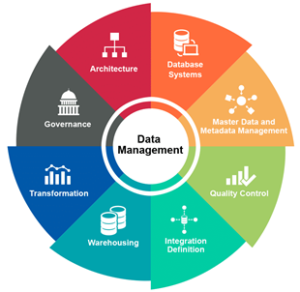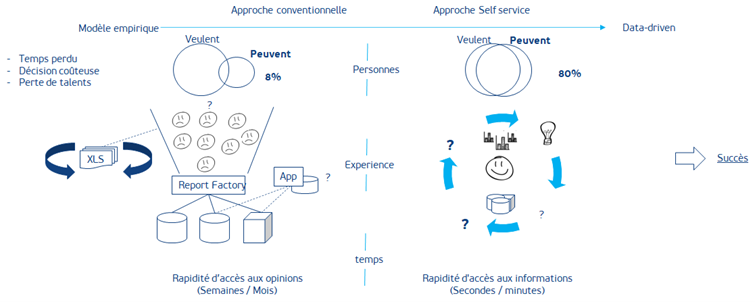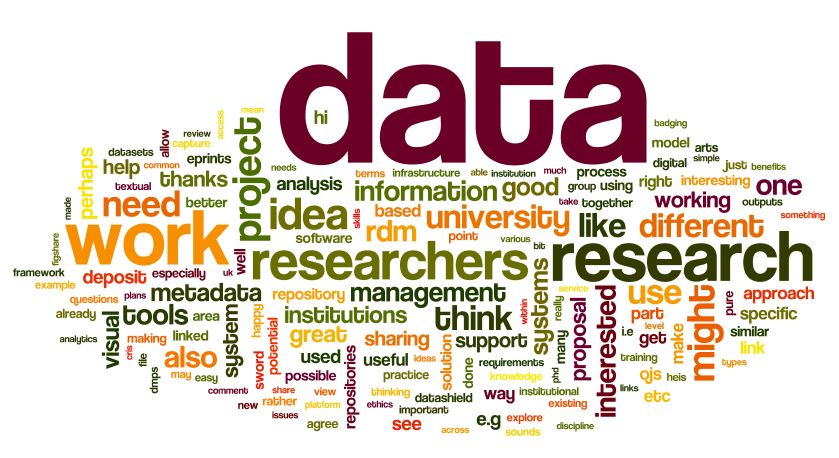RETAIL: Maîtriser vos données métiers // S3E2
Dans l’épisode précédent, nous avions présenté la qualité des données et les enjeux d’une mise en place de process de fiabilisation et de suivi de l’évolution de la donnée au sein d’une organisation. Dans cet épisode, nous vous parlons d’une méthode de gestion de données appelée la « la gestion des données de référence » ou MDM (Master Data Management).
Connaissez-vous cette méthode ?

Le MDM consiste à centraliser la gestion de données dites essentielles intéressant les grandes applications de l’entreprise. Il implique une réflexion plus globale sur l’urbanisation du SI. Tant du point de vue des données que des processus.
Pour mieux cerner la notion de « gestion des données de référence », faisons un tour d’horizon de ce domaine, des fonctionnalités proposées par les outils du marché, et les principaux acteurs.
LES ENJEUX
Le référentiel de données n’est pas une notion nouvelle. Mais le MDM est lui un concept émergent qui prend toute sa dimension aujourd’hui. En effet, la complexité croissante des systèmes d’information souvent éclatés suite à des réorganisations d’entreprises, la volumétrie croissante des informations à gérer, la multiplication des contraintes réglementaires obligent le gestionnaire à mieux maîtriser les informations clés de l’activité de l’entreprise : clients, produits, fournisseurs, etc.
Si la notion de dictionnaire ou « référentiel de données » n’est pas nouvelle, le concept-même de MDM est apparu en 2003 et prend vraiment son essor actuellement. Historiquement, celui-ci s’est développé dans des contextes très verticalisés, et sous deux angles :
– La gestion des catalogues produits (ou PIM pour Product Information Management) notamment dans les domaines de la grande distribution (retail) et du manufacturing,
– L’intégration des données clients (ou CDI pour Customer Data Integration) particulièrement pour l’administration de grosses bases de données transactionnelles (gestion des doublons, vérification et homogénéisation des adresses, etc.).
Ce concept désormais d’autres problématiques et concerne la gestion des tiers et personnes, des produits et des offres, de l’organisation et des structures͕ des nomenclatures et des codifications, de la configuration et des paramètres.

LES CONTRAINTES EXTERNES
Face à la mondialisation et à l’ouverture des marchés͕ les entreprises et organismes publics connaissent de multiples restructurations et opérations de fusion et doivent s’adapter à des contextes d’internationalisation pour se maintenir dans la course et s’ouvrir de nouvelles opportunités de business. Ces structures doivent faire face à de multiples contraintes qui régissent leur environnement :
– La complexité croissante des contraintes réglementaires (Bâle II, IFRS, MIF, etc.) nécessite de collecter plus de données, de justifier davantage les opérations, d’avoir plus de transparence au niveau de la présentation des résultats,
– Une compétitivité plus forte : face à la mondialisation et à l’ouverture des marchés, il faut être en mesure d’anticiper les tendances du marché, mettre en place de nouvelles offres pour répondre aux clients exigeants, répondre à la pression des actionnaires, et enfin pouvoir se mesurer régulièrement à la concurrence,
– Les impératifs de rentabilité sont incontournables face à l’accroissement des risques opérationnels,
–Une organisation centrée sur le client : il s’agit de lui proposer le bon produit, sur le bon canal au bon moment.
LES CONTRAINTES INTERNES
En interne aussi, la gestion de l’information est soumise à des contraintes nombreuses et complexes dues à :
– La multiplication des systèmes et applications,
– La multiplication des données (structurées ou non) avec la dispersion, la redondance et les incohérences sur les données les plus essentielles, les désaccords internes sur la valeur à attribuer à telle ou telle donnée, les définitions incorrectes sur certaines données, la difficulté d’accès et de manipulation des données͕ l’absence de gestion unifiée et maîtrisée des données clés de l’entreprise,
– L’apparition de nouveaux impératifs métier qui nécessitent d’avoir l’information quasi en temps réel , et de se doter des bons indicateurs pour réduire les risques opérationnels.
LES GRANDES FONCTIONNALITES
Parmi les fonctions du Master Data Management, on distingue :
– Les fonctions de base : la gestion du référentiel centralisé, la gestion de catalogues multiples (clients, produits, etc.), la gestion du cycle de vie des données, la gestion des versions Développement, test, production), la gestion des types et liens entre données,
– L’intégration : la synchronisation; le profiling de données et la gestion de la qualité de données, la réplication͕ la transformation͕ l’intégration des données et applications ;au sens chargement ETL des données),
– La modélisation : les outils de modélisation, la découverte et le mapping des données, la gestion des hiérarchies complexes et sémantiques,
– La gouvernance la gestion de la sécurité͕ l’interface utilisateur métier͕ les fonctions de recherche et d’accès͕ le workflow,
– Les fonctions avancées : l’évolutivité, pour étendre le référentiel à d’autres catégories de données via des modèles de données standardisés et extensibles ; la présence d’un moteur de règles, pour piloter et conditionner les processus de mise à jour dans les référentiels ; les fonctions natives de workflow enrichies d’étapes de validation humaines lors du design des flux, la réconciliation des données clients produits entre les différentes applications des fonctions exposées sous forme de Web services pour faciliter le dialogue synchrone avec le référentiel, l’intégration native avec les outils ETL (Outils d’intégration de données) et les outils de gestion de qualité des données.

Use case : l'exemple de Domino's Pizza
Challenge
L’entreprise avait besoin de gérer ses données référentielles afin d’optimiser ses ventes et profits
- L’entreprise avait une directive stratégique d’identifier de façon unique un client et son comportement d’achats.
- Les informations des clients étaient dupliquées et se trouvaient dans différents systèmes. A savoir : l’application web et mobile de commande de Pizzas, le CRM et Applications de gestion commerciales (POS).
Stratégie
Création d’une stratégie Data orientée Client en 3 grands axes :
- Implémentation d’une gestion de données de référence (MDM) des données clients avec la création de « Golden records » (enregistrement unique pour identifier un client) dans le CRM, ERP, et les applications décisionnelles.
- Automatisation de la validation et l’identification des différences entre les systèmes opérationnels en utilisant des règles de gestion métiers.
- Transformation, nettoyage et synchronisation des enregistrements entre les différents systèmes et création d’un workflow permettant de maintenir les données entres les différentes entités du système.
Résultats
- Optimisation des ventes et de la profitabilité avec des campagnes marketing stratégiques et mieux ciblées.
- Création d’un Data hub pour les clients. Tous les systèmes qui utilisent le référentiel client utilise une seul et unique source et version de la donnée.
- Mise en place d’une fondation solide de gestion de données et l’élimination des pratiques manuelles source d’erreurs.
Un projet MDM vise à urbaniser l’administration des données en différenciant bien ce qui est du ressort des applications opérationnelles et des données locales et au contraire ce qui revient au MDM et à la gestion des données de référence d’entreprise͘. Modélisation, intégration et gouvernance sont les grands axes de réflexion des projets MDM͕ lesquels doivent se doter d’une méthodologie rigoureuse assortie des meilleures pratiques.





























